England and France on the way to Trafalgar
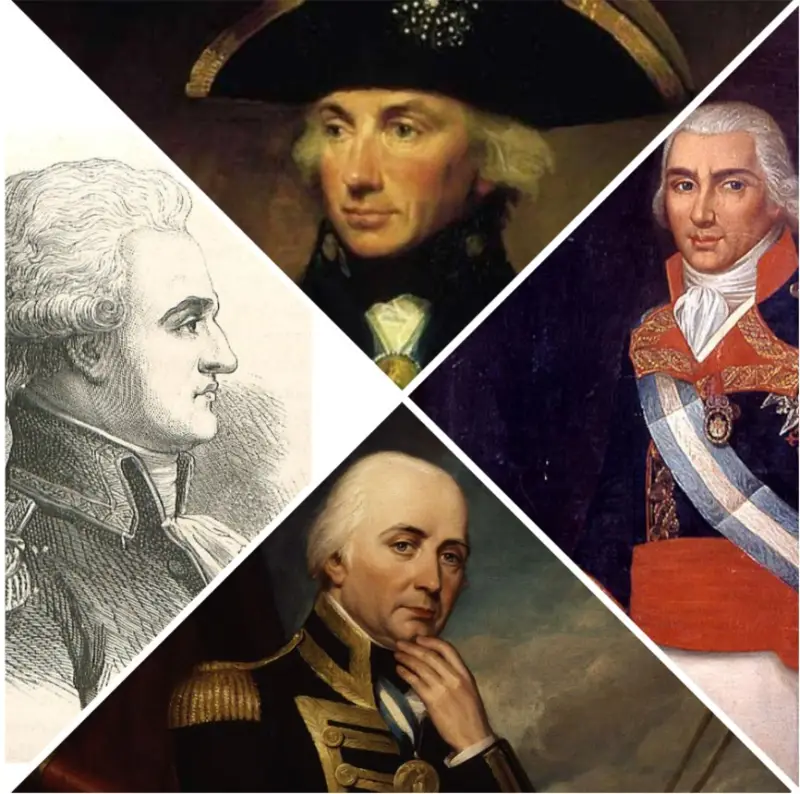
English and French admirals - participants in the Battle of Trafalgar: Pierre-Charles de Villeneuve, Horatio Nelson, Federico Gravina and Cuthbert Collingwood
Most recently we talked about the naval battle of Abukir, which took place on August 1, 1798 (first article, second article). On that day, Horatio Nelson's squadron practically destroyed the French fleet of Admiral de Bruet. The commander of the rearguard, Pierre-Charles de Villeneuve, avoided the battle - he took two battleships and two frigates away from Abukir. Now it’s the turn of the story about the Battle of Trafalgar, in which de Villeneuve again met with Nelson - already as commander of the united Franco-Spanish fleet.
War of the Second Coalition
England had been at war with the French Republic since 1792 and by 1802 had already lost two wars - the First and Second Coalitions. The main success of the British was that same victory in the naval battle of Abukir, after which Bonaparte’s Egyptian army was virtually doomed to defeat. Several victories won by Napoleon could not change the situation. A year later, Bonaparte left his troops, transferring command to Kleber. This general was killed by the Kurdish fanatic Suleiman al-Halabi. His successor, Jacques-François Menou, on August 31, 1801, signed a convention with the British on the abandonment of Alexandria and the return of French troops to France.
In that war, after a brilliant campaign in Italy, Suvorov had a chance to transfer the fighting to French territory. But Andre Massena, in a two-day battle, defeated the corps of Rimsky-Korsakov, with whom the great Russian commander was going to join, forcing him to abandon his plans. Despite all his efforts, Massena was unable to block the path of Suvorov’s army, but what he did was enough for him to be officially declared “Savior of the Fatherland” in France. The difficult transition of Suvorov's army ended on September 30, 1799. And on October 9, General Bonaparte, who left his army in Egypt, set foot on French soil - in Frejus. In Paris, he accepted Sieyès's offer to lead a military coup and a month later he dissolved the Council of Elders and the Council of Five Hundred, becoming First Consul.
After Russia left the war, dark days came for the states of the Second Anti-French Coalition. Napoleon defeated the Austrian troops in Italy, but the victories of the army of Jean-Victor Moreau were even more important. This general went to the front 10 days after his wedding with 19-year-old Creole Alexandrina-Louise-Eugenie Hulot d'Auzery (for the sake of marriage with her, he refused to become related to Napoleon, rejecting both the very “liberated” Caroline Bonaparte and the impeccable Hortense Beauharnais). The Army of the Rhine under the command of Moreau on December 3, 1800, in the decisive battle of Hohenlinden (east of Munich), defeated the troops of Archduke Karl Ludwig John of Hohenzollern. Among the distinguished generals were Grushi and Ney. It was this defeat that brought Austria to the brink of military disaster.
Experts put the Battle of Hohenlinden on a par with the Battle of Austerlitz, and Bonaparte himself called this victory of Moreau one of the greatest in the world stories.
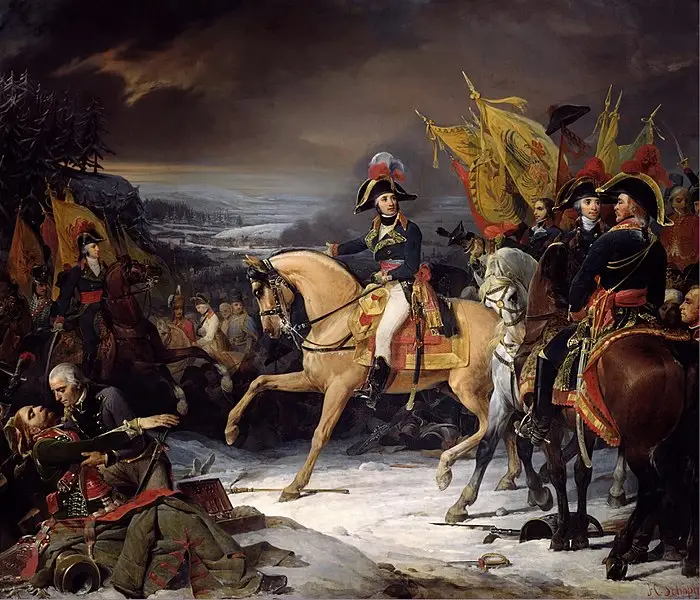
Henri Frederic Schopin. Bataille de Hohenlinden
By the way, even earlier - after Moreau’s victories at Möskirch and Höchstadt, Napoleon wrote to him:
After the defeat at Hohenlinden, Austria was forced to enter into negotiations, which ended on February 9, 1801 with the signing of the Luneville Peace Treaty, which was very beneficial to France. The Batavian and Helvetic Republics, dependent on France, appeared; Austria also recognized the previously existing Ligurian and Cisalpine republics. The British still tried to continue fighting, but fighting alone was always against their rules. In March 1802, the Treaty of Amiens was concluded between France, Spain, the Batavian Republic and Britain. It was then that the English king George III abandoned the lilies in his coat of arms and the title of French king, which English monarchs had borne since the time of Edward III. One of the points of the agreement was the recognition by both parties of the Republic of the Seven Islands, which appeared after the Mediterranean campaign of the squadron of Fyodor Ushakov (as part of the War of the Second Coalition). The Greek population of this republic was pro-Russian, and it was quite possible to create a base for the Russian fleet here, but in Tilsit, Alexander I would agree to its occupation by France.
On the way to the War of the Third Coalition
In Amiens, Great Britain finally recognized the French Republic, but the contradictions between the parties were so great that a new clash was inevitable. Napoleon continued his expansionist policy, annexing the island of Elba to France, and Piedmont, Parma, Plaisance and Guastalla to the Italian (former Cisalpine) Republic, of which he himself was president. A protectorate was established over the Batavian and Helvetic Republics. And Great Britain refused to withdraw its troops from Egyptian Alexandria, Cape Town, and Indian cities belonging to France, to return Majorca to Spain, and Malta to the Johannite Order. In the dispute over Malta, Napoleon suggested that Alexander I, whose father was the Grand Master of the Hospitallers, become the arbitrator. Thus, Bonaparte clearly offered the Russian emperor to come to an agreement and peacefully restore control over Malta, which Paul I had already declared a province of the Russian Empire - in exchange, if not for an alliance with France, then at least for neutrality. However, Alexander, who came to power with active support from the British, did not respond to this proposal.
March 13, 1803 Napoleon concluded his conversation with the British ambassador with the words:
The British responded by demanding the withdrawal of French troops from Switzerland and the Netherlands. France did not have enough funds to prepare for a new war, and therefore negotiations on the sale of Louisiana to the United States were intensified. However, it was not possible to sell Louisiana before the outbreak of hostilities.
On May 10, 1803, the English ambassador Charles Wiworth was recalled from Paris. British Prime Minister Henry Eddington ordered the arrest of all French and Dutch merchant ships that found themselves in English ports (including colonial ones). Napoleon responded by ordering the arrest of all English citizens on the territory of France and the states under its control. On May 16, 1803, the War of the Third Coalition began. By order of Napoleon, Mortier occupied Hanover, which belonged to the English kings, Saint-Cyr went to fight against the kingdom of the Two Sicilies, allied with Britain. It is important for us to note that in 1804 Spain took the side of France.
Bonaparte's "Napoleonic" plans
This time Napoleon decided to “beat the enemy on his territory” - to land an army on the English coast. He said:
According to the drawn up plan, initially 1700 thousand people and 113 horses were supposed to land on 5600 ships and barges on the English coast. Following them, another 590 thousand soldiers and officers and 48 horses were supposed to sail on 3400 barges. The “English” army was formed, units of which were stationed in Boulogne-sur-Mer, near Bruges and in Montreux. The imagination of contemporaries was especially struck by the huge Boulogne camp, which consisted of four separate camps: Ambleteuse, Vimru, Left Bank and Right Bank. Their commanders were Lannes, Soult, Ney and Davout, respectively. General management was carried out by Minister of War Berthier.
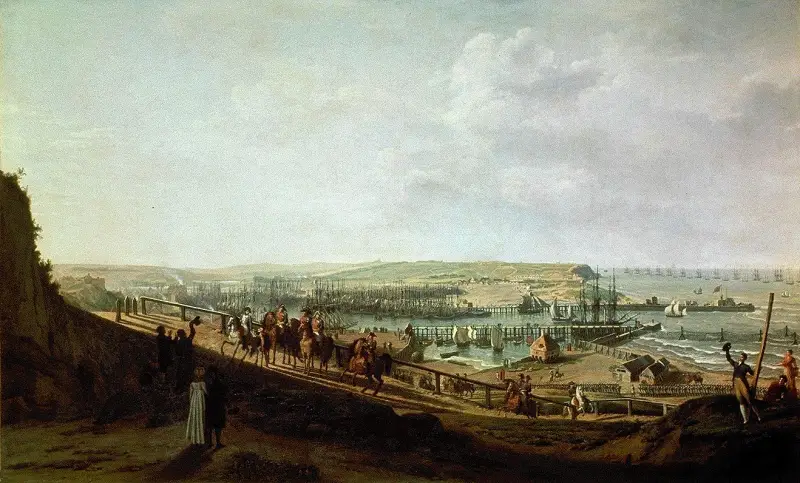
Boulogne military camp, 1804 year. Engraving by an unknown author.
In addition to the barracks, hospitals, kitchens, laundries, repair shops, stables, parade grounds and shooting ranges were equipped. Bonaparte himself visited the Boulogne camp several times. By August 1805, the total strength of the English army reached, according to various estimates, from 180 thousand to 200 thousand people. It was possible to assemble about 2300 landing craft, and Admiral Brewis was appointed to command them.
English newspapers published funny caricatures of Bonaparte and his army.
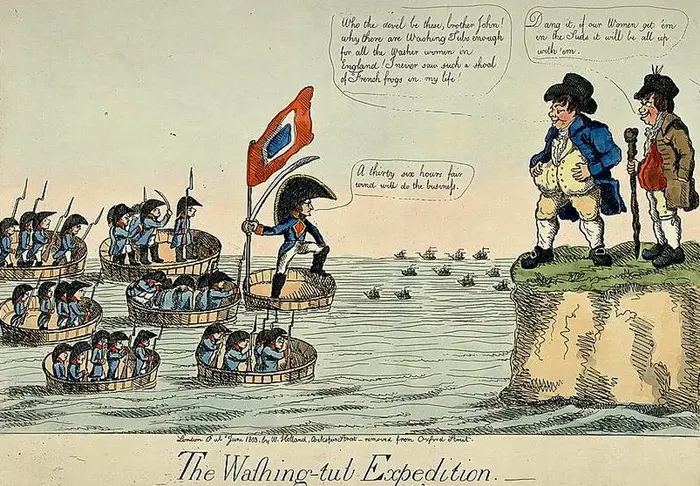
Bonaparte's landing army swims in bath basins. Publisher W. Holland
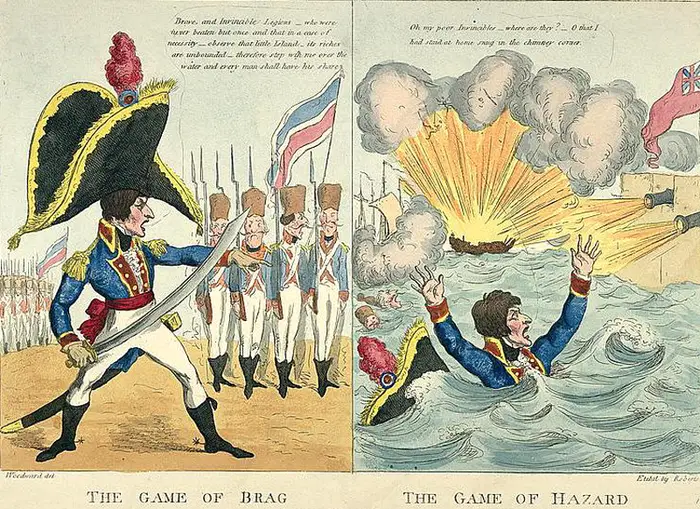
What will happen to Bonaparte if he attacks Britain. Publisher P. Roberts
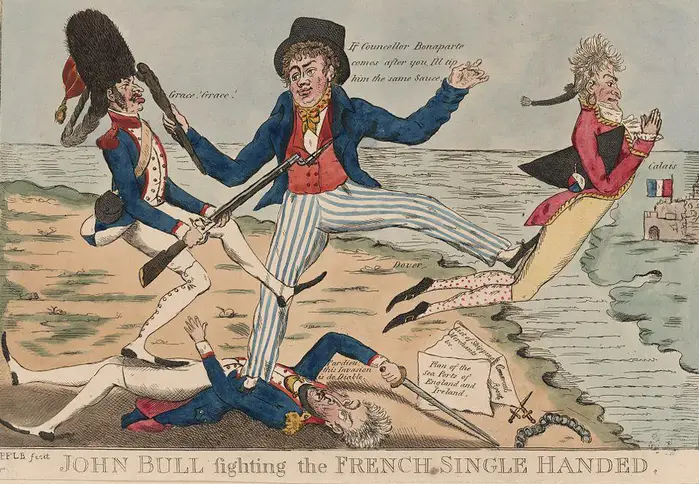
John Bull beats and kicks away the French who invaded Britain. Unknown author, early 19th century
However, King George III and his ministers understood that if at least half of Napoleon's army could land in England, they would have to urgently emigrate to Canada. On the southern coast, old fortifications were urgently modernized, the so-called “Martello towers” were built, on which guns were placed; each of them had to be defended by a platoon of soldiers. Urgent measures were taken to form a new coalition: the Allied armies had to fight instead of the British and for their interests. And, it must be said, the British paid generously for the blood of others. According to the agreement with Russia dated March 30, 1805, they undertook to pay 100 million rubles for 12,5 thousand soldiers and a quarter of this amount to pay for mobilization activities. That is, the price of one soldier was 156 rubles 25 kopecks. And “revision souls” in Russia at that time cost from 70 to 120 rubles. So Alexander I then also made good money from the “sale” of his subjects. There were, of course, other reasons (the economic interests of Russian nobles interested in trade with England, the personal hostility of Alexander I to Bonaparte, who dared to hint at his participation in parricide), but the story about this is beyond the scope of this article.
Bonaparte's deceitful maneuver
The British fleet was much stronger than the French. And so Napoleon decided to lure him out of the English Channel, forcing him to chase the French ships. He wrote:
Vice Admiral Louis-René Latouche-Treville was supposed to lead the French fleet to the West Indies, but due to his death in August 1804, the operation had to be postponed for almost six months.
The new commander was Vice Admiral Pierre-Charles de Villeneuve, who, as we remember, at the Battle of Aboukir commanded the rearguard and, evading battle, brought 4 ships to France. His squadron left Toulon on March 29, 1805. It contained 11 battleships, 6 frigates and 2 sloops. In Cartagena they were joined by 6 Spanish battleships, commanded by Federico Gravina. Napoleon considered this admiral a more outstanding naval commander than Villeneuve. Gravina began serving in the navy as a midshipman in 1768 at the age of 12. In 1779 he received command of the San Luis xebec, in 1785 he led a small squadron operating against Algerian pirates, and in 1790 he became captain of a battleship of the first rank. In 1793, already a vice admiral, he studied naval tactics in British Portsmouth. From 1804 to 1805 was the Spanish ambassador to France, attended the coronation of Bonaparte. And in February 1805 he became commander of the Spanish Royal Navy.
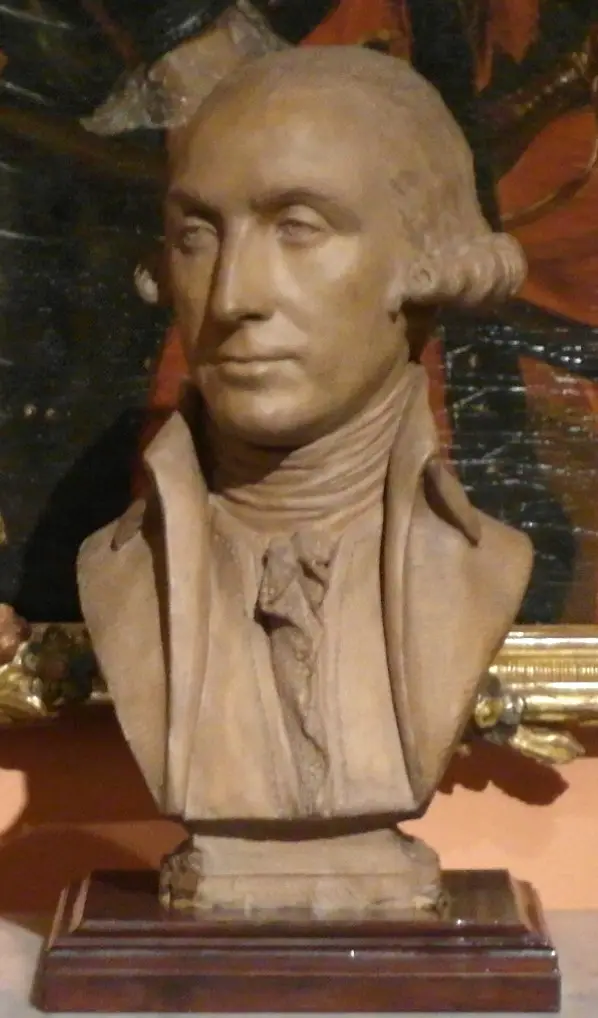
Bust of Federico Gravina, Madrid, Naval Museum
Several British ships were sunk in the Caribbean Sea, but the British fleet did not leave the English Channel.
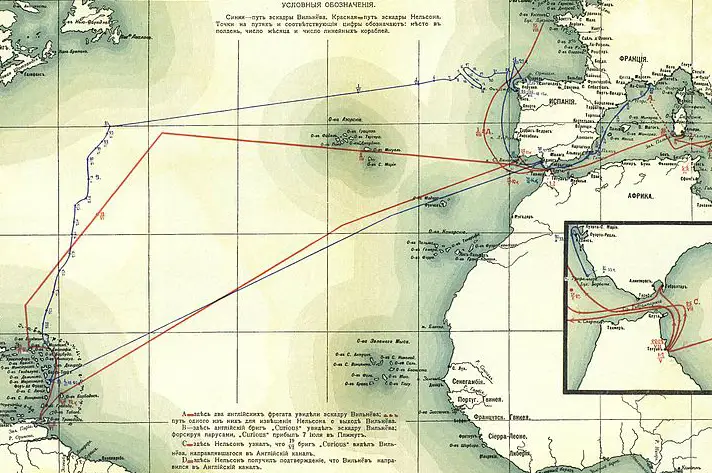
Caribbean expedition of Villeneuve's squadron
When returning to Europe, the Franco-Spanish fleet collided with the squadron of Vice Admiral Robert Calder at Brest on July 22. This battle was fought only by the Spaniards, who lost two ships. The French avoided the battle. Villeneuve led his ships to Cadiz, where they were blocked by the British.
Horatio Nelson on his way to Trafalgar
And what did de Villeneuve’s opponent, Horatio Nelson, do after the Abukir victory? From the article Naval battle of Abukir you must remember that after the victory in this battle, Emma Hamilton, the wife of the English envoy to the court of King Ferdinand IV of the Two Sicilies, took care of the wounded admiral. Then this famous romance broke out.

Emma Hamilton in a 1789 engraving
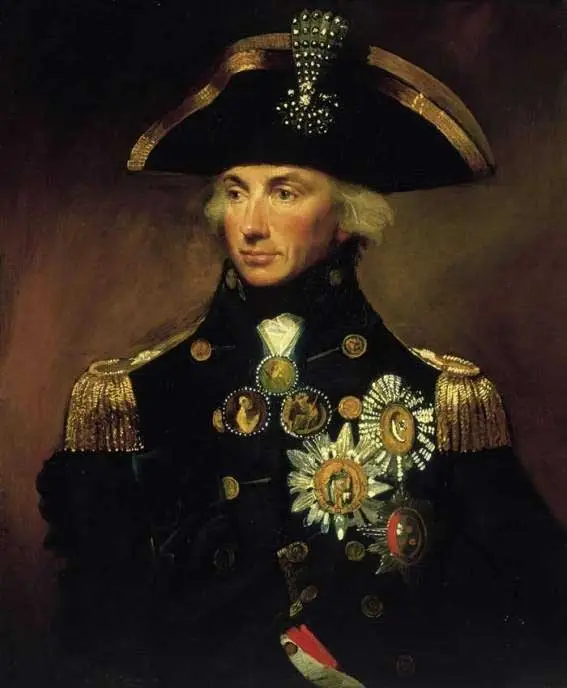
Lemuel Francis Abbott. Vice Admiral Horatio Nelson, 1799
Returning to his homeland with the Hamilton couple in 1799, Nelson settled in the same house with them and continued his relationship with Emma, who in 1801 gave birth to a daughter from him, who received the name Horace in honor of her father. However, officially this girl was considered the adopted daughter of the Hamilton family, Emma Hamilton and Horatio Nelson were recorded as her godparents. In April 1803, Emma's husband, Sir William, died, after which, in order to enter into a new marriage, Nelson unsuccessfully tried to divorce his wife. It soon became clear that William Hamilton’s entire fortune passed to the deceased’s nephew, Charles Greville, whose kept young Emma was for three years. The former lover, thanks to whose lessons the young prostitute turned into a beautiful lady, now kicked her out of the mansion she occupied, and Nelson gave his beloved woman his country house. Early in 1804, Emma gave birth to another daughter, who died in infancy. At this time, Emma began to play cards often, lost, got into big debts, and Battle Admiral Nelson was very poor - almost poor by the standards of London aristocrats. He continued to serve in the navy and on April 2, 1801, as the second flagship of the Baltic squadron of Admiral Hyde Parker, he “punished” Denmark for joining the “Union of Armed Neutrality”, which also included Russia, Prussia and Sweden. Parker intended only to blockade the Danish fleet in Copenhagen harbor, but Nelson insisted on an attack. The battle was fierce, with Nelson ignoring Parker's orders to withdraw the ships.
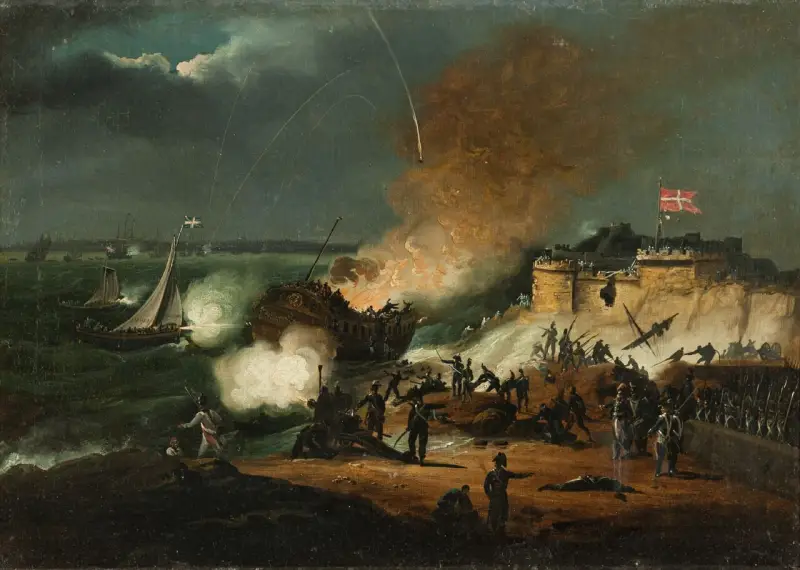
The Battle of Copenhagen in the painting by W. Sandler
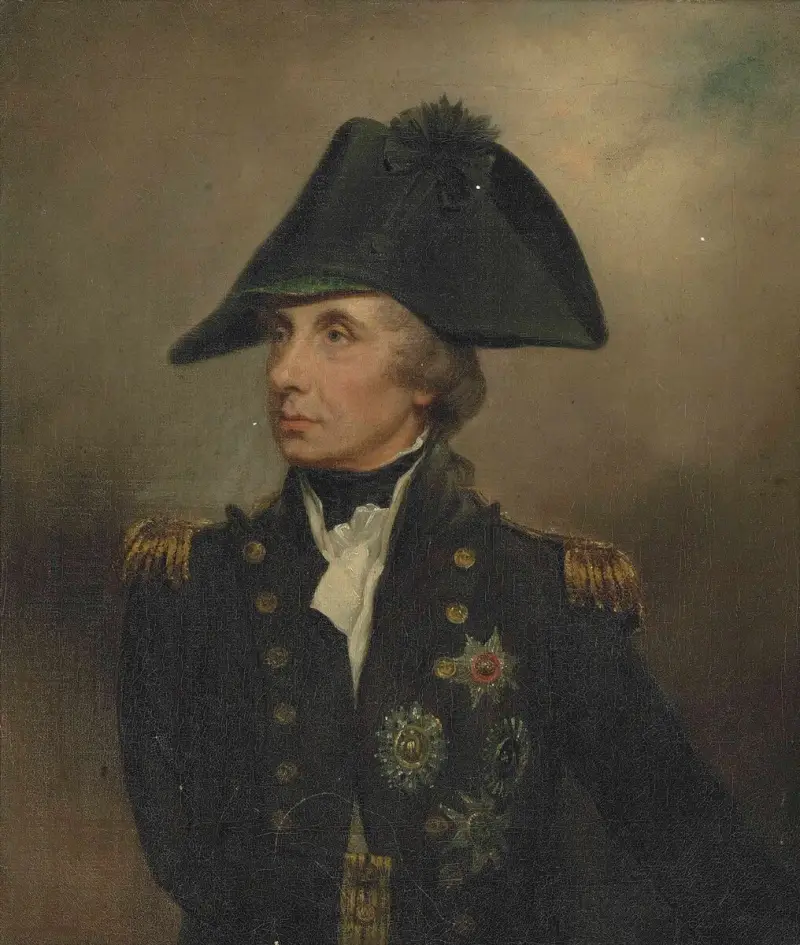
Nelson in a portrait of Arthur William Davis. Pay attention to the green visor that doctors recommended to this admiral shortly before the Battle of Copenhagen: it was supposed to protect the right eye from the glare of the sea, which was damaged in June 1794 from stone fragments during the siege of the Corsican fortress of Calvi
The outcome of the battle had not yet been decided when Nelson addressed the Danes with a letter in which he actually threatened to deal with the captured and wounded Danish sailors:
Denmark withdrew from the Union of Armed Neutrality and allowed the British fleet into the Baltic Sea. Admiral Parker was recalled, and Nelson led his squadron to Revel, where he hoped to find and destroy the now Russian warships. But the Revel squadron was transferred to Kronstadt, and Nelson did not dare to lead his ships along the narrow channel along the powerful forts. His honor was saved by the Russian aristocrats, who by that time had killed Paul I, and the government of the new Emperor Alexander was actively establishing ties with the British. Vice Admiral P.V. Chichagov, who arrived from St. Petersburg, informed Nelson that Alexander I “wishes to resolve all misunderstandings with England peacefully" The delighted British admiral replied that he had no intention of attacking Russian cities - he just wanted to replenish supplies of fresh water and food in Revel, wanted to salute the fortress and asked permission to go ashore. Without hesitation, he wrote to Count P. Palen:
He failed to deceive anyone, and Palen replied:
Nevertheless, his squadron was accepted in Revel. After 4 days, Nelson left this city and soon met the frigate Lawton in the Baltic Sea, on which the British envoy Lord St. Helens was heading to St. Petersburg. The representative of London demanded not to interfere with the planned settlement of relations between England and Russia, and Nelson led his squadron to the west. After another 4 days, Russia and Sweden released the English ships detained in their ports, Alexander I even ordered assistance in repairing these ships.
And Nelson led a squadron cruising in the English Channel, which was supposed to intercept Napoleon's Boulogne fleet. The Mediterranean squadron was also under his command. He had a meeting with the combined Franco-Spanish fleet of de Villeneuve and Gravina, and a famous battle in which death and great glory awaited him. A few hours before his death, he wrote in his will:
In the next article we will continue our story and talk about the famous Battle of Trafalgar.
Information